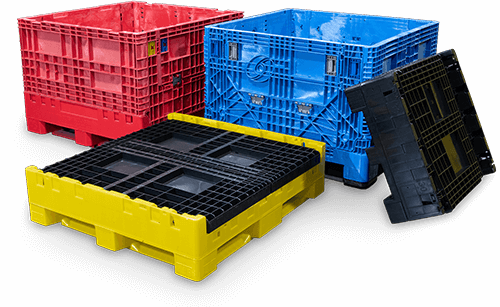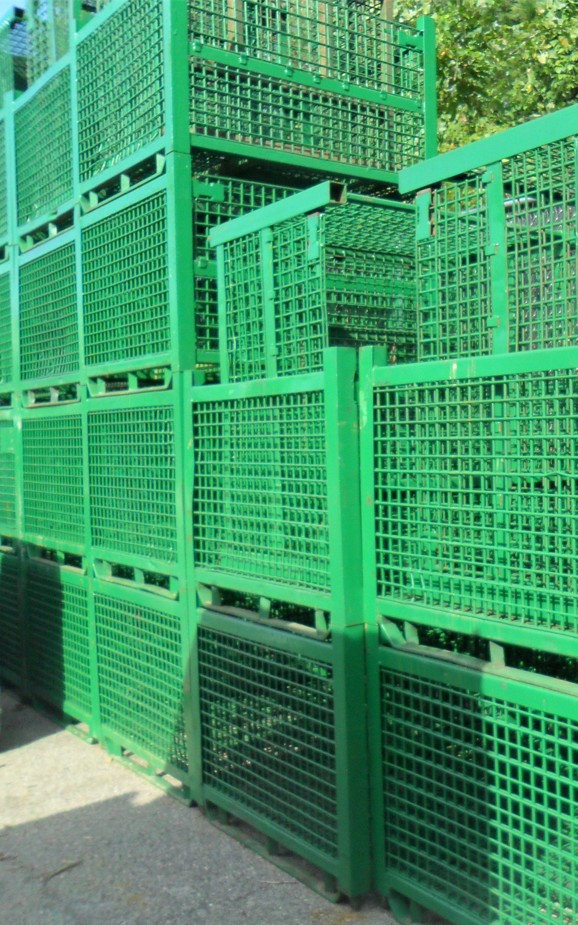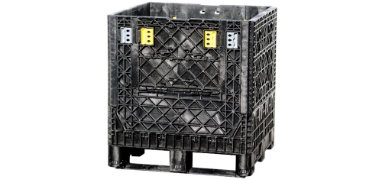Why Bulk Containers Are Important for Sustainable and Cost-Effective Transport
Bulk containers play a vital role in contemporary logistics. They help with the effective movement of big quantities of goods, thus enhancing transport procedures. This approach not only minimizes costs but additionally reduces ecological effect with reduced discharges and waste generation. As markets look for more sustainable practices, the fostering of bulk containers is ending up being progressively considerable. What implications does this shift hold for future logistics and supply chain monitoring?

The Advantages of Making Use Of Bulk Containers in Logistics
Bulk containers revolutionize logistics by enhancing performance and sustainability. These containers permit the transport of large amounts of products in a single journey, considerably decreasing the variety of trips required. This not just simplifies operations yet also reduces labor expenses related to handling, packing, and unloading. On top of that, mass containers are developed to maximize room utilization within transport automobiles, making sure that more items can be delivered concurrently.
The standardization of mass containers also simplifies the logistics procedure. With consistent measurements, they can be easily stacked and stored, leading to improved storage facility administration. Mass containers typically feature long lasting products that protect materials from damages during transportation, therefore lowering item loss and raising total integrity. Therefore, services can experience improved supply chain efficiency, inevitably leading to raised earnings and customer satisfaction. This mix of variables makes mass containers a vital asset in contemporary logistics.
Ecological Impact: Lowering Waste and Carbon Impact
As markets progressively prioritize sustainability, the fostering of mass containers has become a key method for reducing waste and decreasing carbon footprints. These containers decrease using product packaging products, such as boxes and plastic, thereby notably lowering overall waste generation. By combining deliveries, bulk containers improve transportation efficiency, enabling even more items to be transferred per journey. This decrease in journeys straight associates with lower greenhouse gas emissions, adding to a smaller carbon impact.
Additionally, mass containers can typically be reused or recycled, further mitigating environmental impact. The resilience of these containers warranties they can stand up to numerous transportation cycles, minimizing the need for single-use choices. used collapsible containers. By improving logistics and promoting efficient source use, bulk containers not only sustain sustainable practices yet also encourage sectors to align with international environmental objectives. Inevitably, their implementation mirrors a commitment to eco-friendly stewardship and accountable resource management
Expense Cost Savings: How Mass Containers Lower Transportation Costs
While numerous business seek methods to enhance their bottom line, using mass containers provides a significant chance for reducing transport expenses. Mass containers maximize the volume of products delivered, enabling companies to deliver bigger quantities simultaneously. This effectiveness lowers the variety of trips needed, directly decreasing gas costs and reducing labor costs related to loading and dumping.
In addition, bulk containers usually feature streamlined designs that optimize area use within transportation cars. This suggests less vacant rooms, causing a lot more efficient use of available capacity. The resilience of mass containers can reduce the danger of item damages during transit, making certain and minimizing losses that more goods get here intact.
Enhancing Supply Chain Efficiency With Bulk Storage Space Solutions
Bulk storage services play an important function in improving supply chain performance by enhancing supply monitoring. By combining goods right into less, larger containers, services can greatly lower dealing with costs associated with frequent transfers and handling. This streamlined method enables far better monitoring and administration of stock, ultimately bring about enhanced functional performance.
Streamlined Supply Management
Efficient stock administration is vital for enhancing supply chain operations, particularly when organizations adopt bulk storage space services. These solutions make it possible for organizations to keep greater supply levels while minimizing the regularity of replenishment. By consolidating materials right into mass containers, firms can streamline their inventory procedures, lowering the complexity related to tracking numerous smaller bundles. This method facilitates precise inventory counts and improves forecasting accuracy, permitting more enlightened decision-making. Furthermore, mass storage options streamline warehouse company, making it much easier to situate and gain access to products when required. As a result, companies can accomplish a more efficient stock turnover price, eventually boosting total supply chain performance and minimizing the likelihood of stockouts or overstock situations.

Minimized Handling Costs
The implementation of mass storage solutions not only streamlines inventory management however likewise significantly decreases managing expenses throughout the supply chain. By consolidating products into mass containers, companies decrease the requirement for regular handling and transfer in between different storage and transport systems. This method lowers labor costs associated with loading, unloading, and moving smaller packages. Furthermore, bulk storage lowers the frequency of shipments, resulting in reduced transport costs and reduced gas usage. Therefore, organizations can enhance their logistics operations, permitting a more effective allowance of resources. Ultimately, lowered dealing with expenses add to enhanced total supply chain efficiency, promoting a setting that supports both sustainability and financial feasibility.

Versatility of Bulk Containers Throughout Different Industries
Several sectors have distinctive demands for transportation and storage, bulk containers have actually arised as a functional remedy that fulfills a broad range of requirements. These containers, ranging from huge containers to specialized storage tanks, can accommodate varied products, consisting of liquids, granules, and powders. In the agricultural sector, mass containers help with the transportation of plant foods and grains, while the food and beverage sector uses them for ingredients and completed items. The chemical industry counts on mass containers for safely transporting unsafe materials, ensuring compliance with safety guidelines. In addition, construction companies profit from bulk containers for transferring accumulations and other materials. Their flexibility extends to different settings of transport, consisting of vehicles, trains, and ships, boosting logistical performance. This versatility not only improves operations across various markets yet also promotes sustainability by reducing product packaging waste and maximizing room en route. Bulk containers play a vital duty in contemporary supply chain administration.
Future Trends in Bulk Container Use and Sustainability
The future of bulk container usage is increasingly shaped by ingenious products development that improves sustainability. In addition, automation in logistics promises to enhance procedures, minimizing waste and boosting efficiency. Embracing round economic climate practices will certainly further transform exactly how bulk containers are created, used, and reused, promoting an extra sustainable transport landscape.
Cutting-edge Products Growth
As markets progressively prioritize sustainability, ingenious products advancement in bulk containers becomes a considerable consider enhancing green transport options. Scientists and manufacturers are checking out biodegradable plastics, recycled composites, and light-weight steels to lower ecological influence. These products not only reduce waste yet likewise enhance fuel performance by reducing the overall weight of containers. Furthermore, developments in wise materials, which can adapt to differing conditions, improve the longevity and capability of bulk containers. The integration of these ingenious products lines up with circular economic situation principles, advertising reuse and recycling. As the need for sustainable methods expands, the advancement of such materials will certainly play an essential role in forming the future of bulk container usage in logistics and transport.
Automation in Logistics
Significant innovations in automation are poised to transform logistics and the utilization of mass containers, enhancing sustainability in transport. Automated systems, consisting of drones and autonomous vehicles, are simplifying the activity of bulk containers, lowering the reliance on standard fuel-powered transportation. These innovations maximize routing and filling procedures, lessening empty miles and boosting fuel performance. Furthermore, automated stock management systems boost monitoring and monitoring of mass containers, guaranteeing better source allowance and minimized waste. The integration of the Net of Things (IoT) permits real-time information evaluation, making it possible for proactive decision-making that lines up with sustainability objectives. As automation continues to evolve, it is anticipated to drive better developments in mass container usage, inevitably supporting more lasting logistics techniques and decreasing the ecological effect of transportation.
Round Economy Practices
Advancements in automation are setting the stage for a much more incorporated method to round economic climate methods in the domain name of mass container usage. As sectors increasingly embrace sustainability, mass containers are being made for long life and reusability. This change not just minimizes waste however likewise enhances source performance. Firms are adopting methods such as closed-loop systems, where utilized containers are collected, refurbished, and reestablished right into the supply chain. Additionally, wise technologies track container life process, assisting in much better monitoring and decreasing ecological influence. The collaboration between suppliers, logistics carriers, and end-users is important in establishing requirements for lasting container usage. used bulk containers. Future patterns show an expanding emphasis on materials that are recyclable and naturally degradable, additional enhancing the round economy's concepts wholesale transport

Often Asked Questions
What Products Are Mass Containers Usually Made From?
Mass containers are commonly created from long lasting products such as high-density polyethylene, light weight aluminum, cardboard, and steel. click here These products provide adaptability, security, and stamina, making them ideal for transferring various products in various sectors successfully.
Exactly how Do I Select the Right Size Mass Container?
Selecting the ideal dimension bulk container entails reviewing the volume of products to be carried, taking into consideration managing devices compatibility, and appraising storage space demands. Appropriate dimension guarantees effectiveness in transportation and lessens waste throughout delivery.
Are Mass Containers Reusable or Recyclable?
Bulk containers are typically reusable, designed for several trips, boosting sustainability. Numerous can also be recycled, relying on the products utilized. Selecting recyclable options additionally decreases and sustains ecological objectives waste in transport methods.
What Safety And Security Laws Put On Bulk Container Transport?
Safety laws for mass container transport include compliance with the Department of Transport guidelines, proper labeling of unsafe materials, structural integrity analyses, and adherence to weight restrictions to guarantee risk-free handling and protect against crashes during transit.
Exactly How Can Businesses Transition to Making Use Of Bulk Containers Successfully?
Services can transform to bulk containers by assessing existing logistics, training team on handling, purchasing ideal equipment, optimizing stock administration, and teaming up with distributors to ensure compatibility and performance throughout the supply chain.
As markets significantly focus on sustainability, the adoption of bulk containers has actually emerged as a vital approach for reducing waste and reducing carbon impacts. By consolidating materials into bulk containers, firms can enhance their inventory procedures, decreasing the complexity associated with tracking numerous smaller sized packages. As sectors significantly focus on sustainability, innovative products development in mass containers arises as a considerable variable in boosting environment-friendly transport solutions. Automated systems, including drones and self-governing cars, are enhancing the activity of bulk containers, reducing the dependence on traditional fuel-powered transportation. In addition, automated stock monitoring systems improve monitoring and tracking of mass containers, making sure far better source allowance and lowered waste.